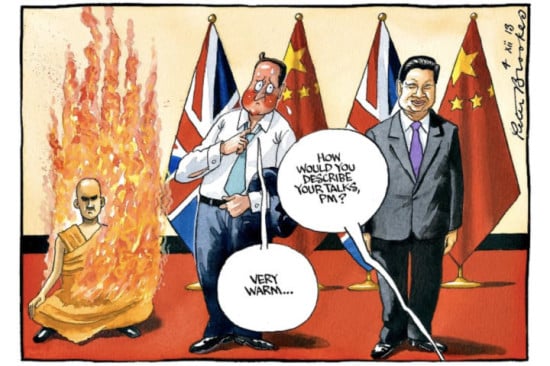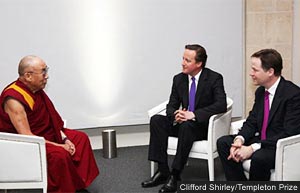Visit demonstrates need for unified EU Approach to Dalai Lama and Tibet

Cartoon in the London Times during Prime Minister Cameron’s China visit (December 2-4, 2013)
Despite UK Prime Minister David Cameron’s conciliatory approach to the Chinese authorities and assertions that he had no plans to meet the Dalai Lama again, as his Beijing visit concluded last week the Chinese state media characterised Britain as an insignificant old country useful only ‘for travel and study’.
Prime Minister Cameron headed the largest trade delegation from Britain to visit China from December 2-4 following a period of diplomatic chill in UK-China relations, which the Chinese authorities blamed on a meeting in May 2012 between the Dalai Lama and UK Prime Minister David Cameron and his deputy Nick Clegg. But there was no evidence of an adverse impact on trade ties, and some figures showed an increase in trade with the UK since the meeting. The UK PM was strongly criticised in the British press for his approach to China, which several correspondents described as ‘humiliating’, with strong concerns being raised about his focus on trade to the detriment of core European values of human rights and democracy.

The Dalai Lama meeting David Cameron and his deputy, Nick Clegg. A video of the Prime Minister and the now Foreign Minister William Hague discussing their meeting with the Dalai Lama in 2008, when both leaders were in opposition, can be viewed at: www.metacafe.com The video disappeared from where it was originally cached on the Conservative Party website during the Prime Minister’s recent visit to China.
Analysts have observed that going to great lengths to accommodate the Chinese leadership’s sensitivities undermines European values and interests, and ultimately weakens EU leverage rather than contributing to the development of strong EU-¬-China relations that encourage China to become a better global citizen. PM Cameron’s trip to China followed a visit by UK Chancellor of the Exchequer George Osborne and London Mayor Boris Johnson, and the announcement of a series of one-sided Chinese deals in critical UK infrastructure (ICT report, Britain emphasizes no policy change on Tibet amid concern over implications of one-sided China deals for UK).
There was no immediate evidence of any impact on trade ties between Britain and China as a result of the PM’s meeting with the Dalai Lama, as they continued to grow in 2012. Britain’s exports to China even rose by a reported 15.5% in 2012, following Cameron and Clegg’s meeting with the Tibetan religious leader in May of that year, Maya Wang of Human Rights Watch observed. Two-way trade between the countries topped $63 billion in 2012, up 7.6% from 2011, according to data provider CEIC, and was up 2.6% year-on-year during the first half of 2013. (The Wall Street Journal – October 17, 2013).
Wang also gave the example of Norway, saying: “Trade rose by 19 per cent between China and Norway between 2011 and 2012, despite Beijing’s ire when the Nobel Peace Prize was awarded to China’s imprisoned dissident Liu Xiaobo in 2010. […] China’s leaders expect criticism from leaders of democracies; indeed, they have long ago priced it into the cost of relations. When governments play the game of not speaking out, the Chinese see them as weak and vulnerable – not just on rights but on trade and other matters.” (Sydney Morning Herald, Bishop must pressure the Chinese on human rights – December 5, 2013).
During a debate entitled ‘Is the Dalai Lama bad for the West?’ in London in the week prior to PM Cameron’s visit to China, scholar Dr Martin Mills argued that the real questions are not about the Dalai Lama, but about Britain. “It’s a question of how we feel about ourselves and what we want our moral and political culture to be.” Dr Mills pointed out that in terms of trade figures, even with a 20% annual expansion rate, it would take five years before British exports to China caught up with those to Belgium, and more than 15 years before they equalled British exports to Germany. Dr Mills said that this raised the question of whether China is worth the compromises, saying that an authoritarian power should “not have the freedom to come and speak to us on issues of Britain’s civilisation and political culture.”
Tibetan scholar Tsering Topgyal argued during the debate that in history, China has always used economic and commercial interests to enforce submission to its agenda, and that today, European nations were often willingly cooperating in their own submission. The debate can be viewed at: http://www.youtube.com/watch?v=xLgpudBWyL0&feature=c4-overview&list=UU5wrgpJVEUa-vACRJpwOqEg.
Some British commentators observed that the UK Prime Minister’s approach, which was criticised by other European diplomats, gave the impression that Europe does not have the diplomatic weight to make an impression and influence China. Philip Stephens wrote in the Financial Times: “This approach ignores Europe’s fundamental interests – strategic and commercial – in helping to shape the nature of China’s rise.” (December 6, 2013).
Jamil Anderlini, citing unnamed European diplomats, wrote in the Financial Times: “The feeling among other European countries, in particular, is that the UK mishandled the initial meeting with the Tibetan leader and then gave in too quickly and completely in its efforts to make up with Beijing. […] Mr Cameron’s decision earlier this year to emphasise Britain’s opposition to Tibetan independence in the House of Commons made the UK look weak when it did not yield an immediate thaw. Subsequent lobbying to arrange official visits before the end of the year looked over-eager.” (Financial Times, Britain wins little reward from China in retreat on Tibet – December 1, 2013).
ICT has urged European countries to develop a common position that it is the right of all European Union Member States leaders to welcome and meet with the Dalai Lama in whatever manner they deem appropriate, in order to counter attempted interference or threats from the Chinese government. This would demonstrate solidarity within the EU, protect individual Member States from Chinese pressure, and send a message that it is not up to the Beijing leadership to dictate a political agenda to democratic European countries.
Downing Street officials in London denied any policy change on Tibet following an editorial in the Chinese state media People’s Daily alleging that the UK’s admission that their ‘mishandling’ of the issue had paved the way for the financial agreements with the PRC (Bloomberg News, U.K. Tibet Pledge Fostered China Deals, People’s Daily Says). “Our position on Tibet is long-standing and there’s been no change,” the Prime Minister’s official spokesman said. “We want strong commercial and diplomatic ties with China, We want to continue to strengthen those, and that’s at the heart of the visit to China that you’ve seen the chancellor making this week.” (The Herald, Downing Street denies Tibet policy change).
Prior to their meeting in 2012, David Cameron met the Dalai Lama in 2008, while he was in opposition. In a video discussion of the meeting posted on the Conservative Party website, Mr Cameron says they had a “wide-ranging discussion” about the situation in Tibet and the Dalai Lama’s call for a genuine autonomy, and seems well-informed about the issues, saying that he asked the Dalai Lama about the status of the Panchen Lama.

